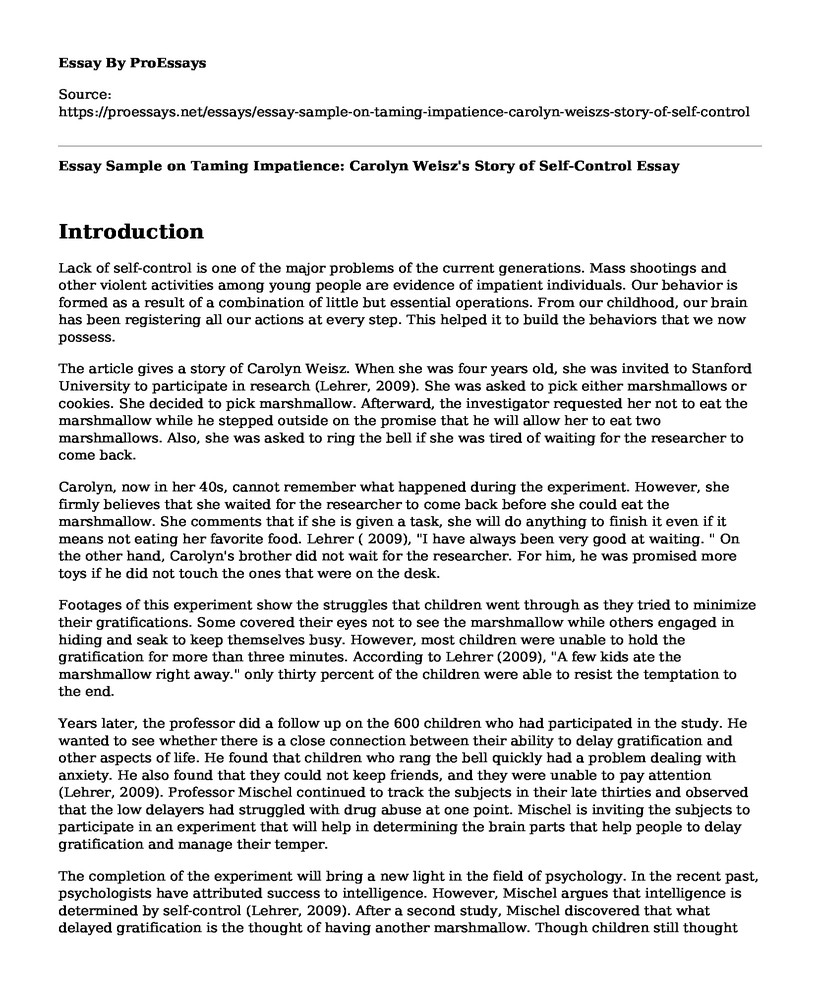Introduction
Lack of self-control is one of the major problems of the current generations. Mass shootings and other violent activities among young people are evidence of impatient individuals. Our behavior is formed as a result of a combination of little but essential operations. From our childhood, our brain has been registering all our actions at every step. This helped it to build the behaviors that we now possess.
The article gives a story of Carolyn Weisz. When she was four years old, she was invited to Stanford University to participate in research (Lehrer, 2009). She was asked to pick either marshmallows or cookies. She decided to pick marshmallow. Afterward, the investigator requested her not to eat the marshmallow while he stepped outside on the promise that he will allow her to eat two marshmallows. Also, she was asked to ring the bell if she was tired of waiting for the researcher to come back.
Carolyn, now in her 40s, cannot remember what happened during the experiment. However, she firmly believes that she waited for the researcher to come back before she could eat the marshmallow. She comments that if she is given a task, she will do anything to finish it even if it means not eating her favorite food. Lehrer ( 2009), "I have always been very good at waiting. " On the other hand, Carolyn's brother did not wait for the researcher. For him, he was promised more toys if he did not touch the ones that were on the desk.
Footages of this experiment show the struggles that children went through as they tried to minimize their gratifications. Some covered their eyes not to see the marshmallow while others engaged in hiding and seak to keep themselves busy. However, most children were unable to hold the gratification for more than three minutes. According to Lehrer (2009), "A few kids ate the marshmallow right away." only thirty percent of the children were able to resist the temptation to the end.
Years later, the professor did a follow up on the 600 children who had participated in the study. He wanted to see whether there is a close connection between their ability to delay gratification and other aspects of life. He found that children who rang the bell quickly had a problem dealing with anxiety. He also found that they could not keep friends, and they were unable to pay attention (Lehrer, 2009). Professor Mischel continued to track the subjects in their late thirties and observed that the low delayers had struggled with drug abuse at one point. Mischel is inviting the subjects to participate in an experiment that will help in determining the brain parts that help people to delay gratification and manage their temper.
The completion of the experiment will bring a new light in the field of psychology. In the recent past, psychologists have attributed success to intelligence. However, Mischel argues that intelligence is determined by self-control (Lehrer, 2009). After a second study, Mischel discovered that what delayed gratification is the thought of having another marshmallow. Though children still thought about the marshmallow, they choose not to think about it. The research helps in understanding how people deal with their problems. The test is a predictive test of the will power. We manage our self-control by shifting our attention to other things.
This study gives an overview of how we organize our brains before reacting to situations. From the survey, there are two categories of individuals. One, those who are looking at the bigger picture of their actions. Two, those who are interested in instant gratification. The study reveals that when we conquer at one point, the brain registers that incident, and it will help us to overcome some more. For example, Carolyn's mind has always registered new challenges conquered (Lehrer, 2009). This has helped her brain to adapt to any changing environment. From the article, we can learn that our childhood activities much shape our current behaviors.
Conclusion
In conclusion, the study highlights some of the possible reasons why people can have more self-control than others. It also explains how instant and delayed gratification affects other aspects of life. The article tends to argue that there is a brain section that allows individuals to delay their gratification though the conclusion has not been made. The marshmallow experiment has shown how one behavior controls other aspects of life.
References
Lehrer, J. (2009). Don't! The Secret of Self Control. The New Yorker. Retrieved 5/3/2010 from http://www. new yorker. com/reporting/2009/05/18/090518fa_fact_lehrer.
Cite this page
Essay Sample on Taming Impatience: Carolyn Weisz's Story of Self-Control. (2023, Mar 12). Retrieved from https://proessays.net/essays/essay-sample-on-taming-impatience-carolyn-weiszs-story-of-self-control
If you are the original author of this essay and no longer wish to have it published on the ProEssays website, please click below to request its removal:
- The Role of Patriarchal Theory in Sexual Violence - Essay Sample
- Why SHARP Cases Continue to Rise in the Army Essay
- Essay Example on Colorado Springs: Poor Neighborhoods, Unemployment, and Inequality
- Essay on Low-Cost Green Housing: Exploring Our Impact and Solutions
- Essay Example on Coffee Addiction: The Story Behind the Stimulating Cup
- Essay Example on Amid Pink Society
- Free Essay Sample on Substance Use







